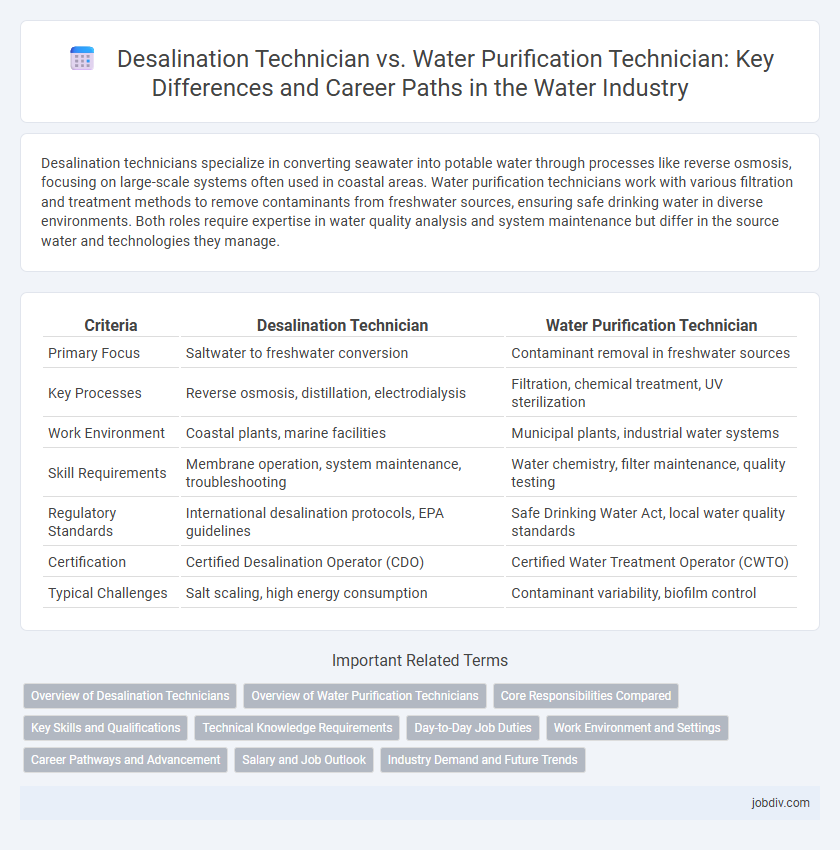Desalination technicians specialize in converting seawater into potable water through processes like reverse osmosis, focusing on large-scale systems often used in coastal areas. Water purification technicians work with various filtration and treatment methods to remove contaminants from freshwater sources, ensuring safe drinking water in diverse environments. Both roles require expertise in water quality analysis and system maintenance but differ in the source water and technologies they manage.
Table of Comparison
| Criteria | Desalination Technician | Water Purification Technician |
|---|---|---|
| Primary Focus | Saltwater to freshwater conversion | Contaminant removal in freshwater sources |
| Key Processes | Reverse osmosis, distillation, electrodialysis | Filtration, chemical treatment, UV sterilization |
| Work Environment | Coastal plants, marine facilities | Municipal plants, industrial water systems |
| Skill Requirements | Membrane operation, system maintenance, troubleshooting | Water chemistry, filter maintenance, quality testing |
| Regulatory Standards | International desalination protocols, EPA guidelines | Safe Drinking Water Act, local water quality standards |
| Certification | Certified Desalination Operator (CDO) | Certified Water Treatment Operator (CWTO) |
| Typical Challenges | Salt scaling, high energy consumption | Contaminant variability, biofilm control |
Overview of Desalination Technicians
Desalination technicians specialize in operating and maintaining systems that convert seawater or brackish water into potable water, using methods such as reverse osmosis and thermal distillation. They monitor water quality parameters, perform routine equipment inspections, and troubleshoot issues to ensure efficient desalination processes. Their expertise is critical in providing sustainable freshwater solutions in arid regions and coastal areas facing freshwater scarcity.
Overview of Water Purification Technicians
Water Purification Technicians specialize in operating and maintaining systems that remove contaminants from water to ensure safe and clean drinking water. Their expertise includes monitoring filtration processes, chemical treatments, and maintaining equipment such as reverse osmosis units and ultraviolet sterilizers. Unlike Desalination Technicians who focus on removing salt from seawater, Water Purification Technicians work primarily with fresh water sources to eliminate pollutants, pathogens, and harmful substances.
Core Responsibilities Compared
Desalination technicians specialize in the operation and maintenance of desalination plants, focusing on removing salt and minerals from seawater to produce potable water. Water purification technicians concentrate on treating and filtering freshwater from various sources, ensuring it meets safety and quality standards by removing contaminants and pathogens. Both roles require knowledge of water treatment processes and system maintenance, but desalination technicians often work with reverse osmosis and thermal distillation technologies, while water purification technicians typically handle filtration, chlorination, and chemical dosing systems.
Key Skills and Qualifications
Desalination Technicians specialize in operating and maintaining reverse osmosis and thermal desalination systems, requiring strong skills in membrane technology, chemical dosing, and mechanical troubleshooting, along with certifications in water treatment and plant operations. Water Purification Technicians focus on treating freshwater using filtration, chlorination, and UV disinfection, emphasizing knowledge of water quality testing, chemical handling, and regulatory compliance. Both roles demand proficiency in system monitoring, safety protocols, and environmental regulations, but desalination requires expertise in salt removal processes, while purification technicians prioritize contaminant removal and potable water standards.
Technical Knowledge Requirements
Desalination Technicians require in-depth knowledge of reverse osmosis, thermal distillation processes, and salt ion exchange mechanisms to efficiently convert seawater into potable water. Water Purification Technicians specialize in understanding filtration technologies, chemical dosing, and pathogen removal methods essential for treating freshwater sources. Both roles demand proficiency in water quality analysis, system maintenance, and regulatory compliance, but desalination technicians focus more on advanced membrane technology while purification technicians emphasize contaminant elimination techniques.
Day-to-Day Job Duties
Desalination Technicians operate and maintain equipment that removes salt and minerals from seawater to produce potable water, regularly monitoring reverse osmosis membranes and desalination plant performance. Water Purification Technicians focus on treating freshwater by adjusting chemical levels, filtering contaminants, and ensuring compliance with safety standards through routine water quality testing. Both roles require troubleshooting mechanical systems and adhering to environmental regulations, but desalination emphasizes salt removal processes while purification centers on contaminant filtration and chemical treatment.
Work Environment and Settings
Desalination technicians primarily operate in coastal facilities where seawater is treated using reverse osmosis or thermal distillation processes, often facing harsh marine conditions and exposure to corrosive saltwater equipment. Water purification technicians typically work in urban and rural water treatment plants, handling filtration, chemical treatment, and monitoring equipment to ensure potable water quality in more controlled indoor environments. Both roles require adherence to safety protocols, but desalination technicians encounter more complex environmental challenges due to the nature of seawater and marine infrastructure.
Career Pathways and Advancement
Desalination technicians specialize in operating and maintaining systems that remove salt and minerals from seawater, offering career advancement in large-scale desalination plant management and process engineering. Water purification technicians focus on treating freshwater to remove contaminants and improve quality, with growth opportunities in regulatory compliance, water quality analysis, and municipal water treatment facility leadership. Both career pathways benefit from certifications in water treatment technologies and environmental safety, facilitating movement into supervisory or technical specialist roles within the water industry.
Salary and Job Outlook
Desalination technicians typically earn a median salary of $48,000 to $65,000 annually, driven by growing demand in arid regions and coastal cities where seawater desalination is essential. Water purification technicians, focusing on municipal and industrial water treatment, report similar salary ranges of $45,000 to $62,000, with steady job outlook growth due to increasing regulations on water quality. Both career paths offer stable employment opportunities, but desalination technicians may experience faster growth rates in areas facing freshwater scarcity challenges.
Industry Demand and Future Trends
Desalination technicians are experiencing increasing demand due to the rise in global water scarcity and coastal urbanization, driving the expansion of desalination plants worldwide. Water purification technicians remain essential for maintaining and upgrading conventional and advanced filtration systems in municipal and industrial settings, with growing emphasis on sustainability and contaminant removal technologies. Future trends indicate a convergence of both roles towards integrating smart technologies and renewable energy sources to enhance water treatment efficiency and environmental impact.
Desalination Technician vs Water Purification Technician Infographic

 jobdiv.com
jobdiv.com